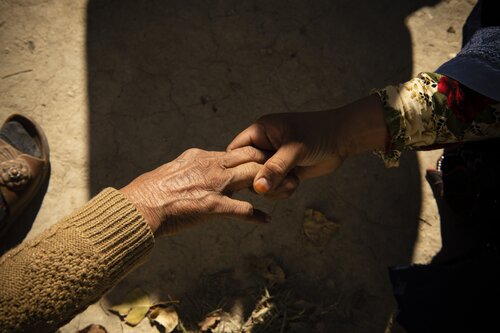La CSU2030 a organisé sa réunion annuelle à l'occasion de la...
11 décembre 2023
An urgent call to unite behind health and UHC for peace.

We are gravely concerned about the deteriorating health situations in active conflict zones around the world. This UHC Day, we call on the international community to protect and respect health as a fundamental human right for all and appeal for uninterrupted access to health care and humanitarian assistance in conflict settings, particularly in the on-going conflict and humanitarian crises in Gaza. With over 32 active armed conflicts world-wide and global instability as countries face escalating climate-related emergencies, now, more than ever, it is critical for world leaders to unite behind their commitments to universal health coverage (UHC).
UHC means that all people, without discrimination, have access to the full range of quality health services they need, when and where they need them, without financial hardship. The fallout of conflicts and complex emergencies on people’s health and well-being is even more alarming given that 4.5 billion people are not fully covered by health services and 2 billion are facing impoverishing out-of-pocket health spending.
To deliver on UHC, countries need to have resilient and equitable health systems that are rooted in the communities they serve. Conflicts and humanitarian crises pose existential risks to UHC. They cause disruption of health systems and primary health care services, collapse of essential medical supply chains, erosion of capacities for health security preparedness, and breakdowns of social and economic systems which cause an exodus of health care workers and upsurges in both epidemics and starvation. Around 80% of WHO’s humanitarian caseload, as well as 70% of disease outbreaks, take place in conflict-affected settings.
Unfolding humanitarian catastrophes are a tragedy for all people facing the consequences of war. As well as direct loss of life, we are deeply concerned about disruptions to essential health care. While humanitarian and conflict settings create significant challenges for UHC, prioritizing UHC within these settings can also bring about peace.
Health is a neutral point for bringing together rival and conflicting parties as they work towards the same health goals. We therefore urgently call on the international community, especially world leaders involved in humanitarian and diplomatic efforts, to protect the right to health for all people in all settings and promote peace through UHC by:
- Holding Member States accountable for complying with their obligations under international and humanitarian law.
- Urging for unrestricted humanitarian access and sustained access to water, food and health services for all populations, across all fragile and conflict settings, and ensuring, to the fullest extent possible, timely medical care for all wounded and sick people, including specialized care for non-communicable disease, mental health, maternal, newborn and child health, and sexual and reproductive health.
- Ensuring the protection of all civilians and civilian infrastructure, including health-care facilities and the guaranteed protection of humanitarian and health and care workers, the majority of which are women.
- Working together to address health needs in conflicts and humanitarian crises and ensuring the provision of essential health services and public health functions, in line with humanitarian principles – paying special attention to the health needs of women and girls, vulnerable and marginalized groups, and refugees and internally displaced people.
- Acting for solidarity and equity, including in fragile settings, by mobilizing well-aligned international support for resilient health systems based on primary health care, for UHC and health security.
- Creating safe spaces for participation and dialogue with local and regional governments, civil society and all stakeholders to ensure people’s voices are heard, irrespective of where their national governments stand. This is critical for humanitarian action, peacebuilding, longer-term reconstruction to respond to communities’ needs, and the multilateral response to all crises to be truly inclusive.
It is a humanitarian imperative and moral duty for world leaders and the global health community to respect humanitarian principles in conflicts and ensure the fulfillment of the right to health for everyone, everywhere. We call on all countries to unite behind health and UHC for peace.
Co-Chairs of Steering Committee, UHC2030:
- Ms. Gabriela Cuevas Barron
- Dr. Justin Koonin
UHC Movement Political Advisory Panel, UHC2030:
- Ms. María Fernanda Espinosa Garcés, President of the 73rd Session of the UN General Assembly
- Dr. Vytenis Povilas Andriukaitis, Former European Commissioner for Health and Food Safety
- Elhadj As Sy, Chair of the Board, Kofi Annan Foundation
- Prof. Ilona Kickbusch, Chair, International Advisory Board, Global Health Centre, Graduate Institute for International and Development Studies Geneva
- Dr Sania Nishtar, Member of the Senate, Pakistan
- Joy Phumaphi, Executive Secretary, the African Leaders Malaria Alliance and Co-chair of the Global Preparedness Monitoring Board
- Ms. Emilia Saiz, Secretary General of United Cities and Local Governments
- Prof. Keizo Takemi, Minister of Health, Labour and Welfare, Japan
Photo: © WHO / Kiana Hayeri
